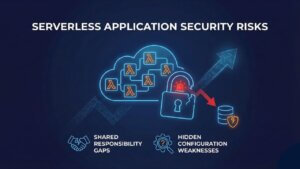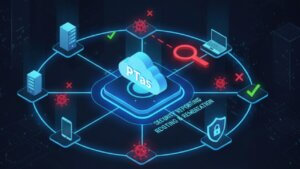Businesses are increasingly turning to cloud computing to streamline operations, enhance scalability, and reduce costs. However, with great opportunity comes great risk. A single misstep in cloud security can have devastating consequences, from data breaches to financial losses and reputational damage. Here are five shocking cloud security mistakes that could ruin your business — and how to avoid them.
Table of Contents
What is Meant By Cloud Security Mistakes?
Cloud security mistakes refer to common errors or oversights made when managing and securing cloud-based environments, which can lead to vulnerabilities and security risks. These mistakes can include:
Weak Access Controls: Failing to properly manage user permissions or not implementing multi-factor authentication (MFA) can expose sensitive data to unauthorized access.
Misconfigured Cloud Settings: Incorrect configurations in cloud services, like public access to private storage or not enabling encryption, can make systems vulnerable to attacks.
Lack of Monitoring: Not actively monitoring cloud environments for suspicious activities or potential breaches can delay detection and response.
Insecure APIs: Using unsecured or poorly designed application programming interfaces (APIs) can lead to data leaks or unauthorized access.
Inadequate Data Encryption: Storing data without encryption—either in transit or at rest—can expose sensitive information to cybercriminals.
Over-reliance on Cloud Providers’ Security: Assuming the cloud provider’s security measures are enough without taking additional steps for securing your specific workloads and data.
Not Updating and Patching: Failing to regularly update cloud-based software or systems can leave known vulnerabilities open to exploitation.
These mistakes can result in data breaches, financial loss, or reputational damage if not addressed. In this blog we explore 5 shocking cloud security mistakes that could ruin a business.
1. Neglecting the Shared Responsibility Model
One of the most common mistakes businesses make is misunderstanding the shared responsibility model. Cloud providers like AWS, Azure, and GCP offer secure infrastructure, but the responsibility for securing data, applications, and user access rests with the customer.
Why it matters: Assuming that the cloud provider handles everything can leave your business vulnerable to attacks due to weak configurations, unprotected data, or compromised credentials.
How to avoid it:
Educate your team on the shared responsibility model.
Regularly review and update your security configurations.
Implement tools to monitor and enforce security policies in your cloud environment.
2. Failing to Secure API Endpoints

APIs are the backbone of cloud integration, enabling applications to communicate and exchange data. Unfortunately, unsecured or poorly managed APIs are a favorite target for cybercriminals.
Why it matters: Exposed APIs can lead to unauthorized access, data leaks, and even full-scale breaches.
How to avoid it:
Use API gateways to control access and monitor traffic.
Enforce strong authentication and authorization measures.
Regularly test APIs for vulnerabilities with tools like OWASP ZAP or Postman.
3. Overlooking Data Encryption

Encryption is a fundamental aspect of cloud security, yet many businesses fail to encrypt sensitive data adequately. This oversight leaves data vulnerable to interception during transmission or compromise while at rest.
Why it matters: Without encryption, sensitive information like customer data, financial records, and intellectual property can be easily exploited by malicious actors.
How to avoid it:
Encrypt all data at rest and in transit using industry-standard protocols like AES-256.
Use encryption tools provided by cloud providers, such as AWS Key Management Service or Google Cloud Key Management.
Ensure proper encryption key management practices to avoid accidental exposure.
4. Ignoring Identity and Access Management (IAM) Best Practices
Weak or misconfigured IAM policies can open the door to unauthorized access. Failing to enforce least privilege access or overlooking MFA (multi-factor authentication) are glaring mistakes that attackers can exploit.
Why it matters: Unauthorized access can lead to data theft, operational disruption, and compliance violations.
How to avoid it:
Enforce least privilege access to limit user permissions.
Implement MFA across all accounts, including administrator accounts.
Regularly audit and review access logs for suspicious activity.
5. Neglecting Regular Security Assessments
In the fast-evolving landscape of cyber threats, a static security posture is a risky approach. Many businesses fail to conduct regular security assessments, leaving vulnerabilities unaddressed for extended periods.
Why it matters: Unpatched vulnerabilities or overlooked misconfigurations can serve as entry points for attackers.
How to avoid it:
Perform regular penetration testing and vulnerability assessments.
Use automated tools to scan for misconfigurations and weak points in your cloud environment.
Stay informed about the latest security patches and updates from your cloud provider.
The High Stakes of Cloud Security
The cloud offers unparalleled advantages, but it also demands a vigilant approach to security. Neglecting critical aspects like the shared responsibility model, API security, encryption, IAM practices, and regular assessments can have catastrophic consequences for your business. By proactively addressing these issues, you can not only safeguard your operations but also build trust with your customers and stakeholders.
Conclusion
Don’t let these shocking cloud security mistakes jeopardize your business. Take action today by auditing your cloud security posture, implementing best practices, and leveraging advanced tools to stay ahead of evolving threats. Remember, in the digital age, a secure cloud is the foundation of a successful business.
Why Businesses Trust SecureMyOrg for Comprehensive Network Security
At SecureMyOrg, we uncover and fix all possible security vulnerabilities of mobile and web, while providing solutions to mitigate risks. We are trusted by renowned companies like Yahoo, Gojek and Rippling, and with 100% client satisfaction, you’re in safe hands!







Some of the things people reach out to us for –
- Building their cybersecurity program from scratch – setting up cloud security using cost-effective tools, SIEM for alert monitoring, building policies for the company
- Vulnerability Assessment and Penetration Testing ( VAPT ) – We have certified professionals, with certifications like OSCP, CREST – CPSA & CRT, CKA and CKS
- DevSecOps consulting
- Red Teaming activity
- Regular security audits, before product release
- Full time security engineers.
Relevant Posts

Top Cybersecurity Threats Facing Businesses In 2026
Businesses entering 2026 face a security landscape that is more complex, more interconnected, and far less forgiving than in previous years. Cybersecurity threats no longer

Top 5 Security Weaknesses Cloud-Native Apps Commonly Ignore
Cloud-native applications promise speed, flexibility, and scalability. Teams ship features faster, infrastructure adapts automatically, and operational overhead drops. Yet many organizations discover later that security

Why Weak Serverless Application Security Puts Your Business at Risk
Weak security in serverless environments often goes unnoticed until it leads to real damage. Misconfigured triggers, broad permissions, and poor visibility can expose sensitive data and disrupt business operations. Understanding where the risks appear is the first step toward building safer, more reliable serverless applications.

What Is Penetration Testing as a Service?
Penetration testing as a service (PTaaS) lets experts simulate real attacks to uncover vulnerabilities before hackers do. This guide explains the process, benefits, and costs, helping businesses strengthen defenses with predictable, ongoing security checks.

How To Inspect Encrypted Traffic Without Breaking Privacy
Network administrators face a challenge: securing systems while respecting privacy. This guide explains how to inspect encrypted traffic without breaking privacy using metadata, anomaly detection, and machine learning ensuring visibility, compliance, and trust.

How to Audit Infrastructure as Code (IaC) for Security Vulnerabilities
Discover how to audit Infrastructure as Code (IaC) for security vulnerabilities with this practical guide. Learn to scan IaC files using tools like Checkov, fix issues like exposed resources, and integrate audits into CI/CD pipelines. Protect your cloud systems from misconfigurations and ensure compliance with clear, actionable steps.
